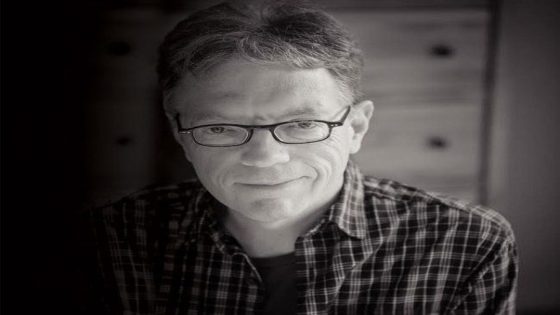Charles R. Cross, a Seattle-based music journalist who edited the city’s preeminent alt-weekly, the Rocket, and penned bestselling biographies of Kurt Cobain, Jimi Hendrix and other major rock figures, died Friday at age 67.
“We are sorry to share that Charles Cross has passed,” the writer’s family said in a statement. “He died peacefully of natural causes in his sleep on August 9, 2024. We are all grief-stricken and trying to get through this difficult process of dealing with the next steps.”
Among those mourning Cross was veteran Los Angeles Times rock critic and biographer Robert Hilburn, who wrote on the X platform that Cross’ heralded book “Heavier Than Heaven: A Biography of Kurt Cobain” was “high on my short-list of best music biographies ever.” Said Hilburn, “He was as warm and gracious as he was a passionate and compelling writer.”
Said his longtime agent, Sarah Lazin, “I’m stunned and devastated. We worked together — and were friends — for 30 years, starting with ‘Heavier Than Heaven,’ which is still in print all over the world 20-plus years later. We did many books together, and most recently sold, with Laura Nolan, a co-agent at Aevitas Creative Management, his next project, a memoir featuring his beloved Seattle. I’d just spoken to him on Thursday and he seemed happy, vibrant, and excited about all that was happening. A brilliant and passionate author and loving dad. My heart goes out to his son Ashland and to us all. What a loss.”
Cross published nine books, including the New York Times bestsellers “Room Full of Mirrors: The Biography of Jimi Hendrix,” and — with Ann and Nancy Wilson, the frontwomen of the group Heart — “Kicking & Dreaming: A Story of Heart, Soul, and Rock & Roll.”
Cross was the most visible and influential rock journalist on the Seattle music scene over a period of decades, especially in the nearly decade and a half — 1986 through 2000 — that he served as the editor of the weekly newspaper the Rocket, where he was well-positioned to spot and chronicle the nascent Nirvana, as well as other artists that would soon grow from being local cult favorites to international “grunge” superstars.
Cross also founded and for many years edited the Bruce Springsteen magazine Backstreets, possibly the best regarded of all the fanzines devoted to a single artist.
As a chronicler of Cobain, Cross said, “We [at the Rocket] were the first magazine to ever review Nirvana, the first magazine to ever put them on the cover, and Kurt even was our customer — he advertised in our paper looking for drummers. So I chronicled the scene and knew everybody and ultimately felt that some of the stories about Kurt were just not right.”
“Heavier Than Heaven” was called “one of the most moving and revealing books ever written about a rock star” by the Los Angeles Times. It won the 2002 ASCAP Award for Outstanding Musical Biography. Cross conducted more than 400 interviews for the book, and was granted significant access by Courtney Love. Cross had said that Love “felt that to understand him, I needed to read his inner thoughts,” he said. “The diaries really changed this book dramatically because they gave me a place to have Kurt’s voice.”
He further explained, “Some of my motivation was that I did feel the story wasn’t being told properly,” noting that he wanted to delve into areas he thought other writers had avoided, from the rock icon’s history of suicidal impulses to his conflicting impulses about commerciality. Cross said he was affected by the access he was given into Cobain’s innermost thoughts. “At times I was moved to tears by reading his pleas to his God, asking to be able to kick drugs,” he said in a 2004 interview. “There’s no way any human being can read that and not break down. It was heartbreaking to realize how sad he was.”
The Cobain biography was optioned by Universal Pictures, resulting in widespread speculation about which young actor could play the lead, but never made it out of development.
Earlier, Cross had penned “Nevermind: The Classic Album.” He followed the bestseller “Heavier Than Heaven” with two other books about the late rock star, “Cobain Unseen” and “Here We Are Now: The Lasting Impact of Kurt Cobain.”
Cross first caught the attention of national readers when he started up Backstreets in 1980, printing 10,000 copies of a four-page tabloid devoted to Springsteen, which he passed it, gratis, at a Seattle Coliseum show. In 1989, a collection of writings from Backstreets co-edited by Cross was published in book form, titled “Springsteen: the Man and His Music,” with Cross writing in the forward about that first issue and saying, “Little did I know at the time that a decade later the damn thing would still be around as a quarterly magazine and be called by some ‘the world’s greatest fanzine.’”
Initially, Cross wrote out subscription labels for Backstreets by hand. By the publication’s tenth issue, it had graduated from newsprint to a full-color, slick-paper format. With Cross eventually moving on to other journalistic pursuits, Backstreets continued as a magazine or website and a primary Springsteen resource until early 2023.
Just prior to starting Backstreets, Cross had served as editor of the the University of Washington’s Daily in 1979. He graduated from the school with a degree in creative writing.
Other books included “Led Zeppelin: Heaven and Hell” and “Led Zeppelin: Shadows Taller Than Our Souls.”
Cross had chops as a critic but ultimately felt his greatest gift was in crafting narratives. “As a rock critic, you tend to use the same words in every review. Eventually, you begin to look at this and say ‘My God, I’ve used every one of these adjectives 15 times before, in different combinations.’ So I think one of the things I’ve tried to concentrate on is letting the storytelling carry it, instead of approaching it like a critic would.”
In recent years, Cross had been at work on a book that he described to an interviewer as “a memoir that’s a little bit about my life and a little bit about Seattle music history.”
No one doubted that Cross had his finger on the pulse of what was captivating Seattle during those early ’90s salad days, and what would ultimately entrance the world. Peter Blackstock, who later became a columnist for the Seattle Post-Intelligencer and co-founded No Depression, remembered when he first went to meet Cross in the Rocket offices in 1991. “One memory is very vivid,” Blackstock wrote on Facebook. “I asked him about shows worth checking out that weekend, so he grabbed a copy of the Rocket and turned to the club listings. ‘Oh, you should go to this,’ he said, pointing at a listing for a show at the Off Ramp by a band called Mookie Blaylock. I’d never heard of them, but I took his word for it. And that’s how I ended up seeing Pearl Jam play to about 300 people, six months before ‘Ten’ came out.”
Cross had plans to publish a compendium of material from the Rocket, as well. Cross had formerly lamented that the alt-weekly’s archives did not survive online, but was pleased when the publication was finally fully digitized, a project that was announced in December 2023. (Those archives can be found here.)
Cross had also been contributing to the Seattle Times. In his most recent pieces for the city’s daily, he had profiled fellow authors, including Anupreeta Das, about her Bill Gates biography, and Ann Powers, about her new book about Joni Mitchell’s career.
Cross’ writing also appeared in Rolling Stone, Spin, Esquire, Playboy, Guitar World, Q, Uncut, Creem, the London Times, the Los Angeles Times and the Seattle Post-Intelligencer.
Cross’ last Facebook post, dated Aug. 6, was devoted to his excitement about the upcoming election — and, naturally, the music choices of the respective candidates. “Husker Dude Vs. ‘Couchcella.’ Strictly from a music critic perspective, this is a no-brainer,” he wrote. “On one ticket you’ve got a party who can only scare up Kid Rock for a convention, where the VP loves GNR (and who is vulnerable to jokes that ‘Couchcella’ is his favorite festival). On the other side you’ve got a presidential candidate who likes Roy Ayers and Ellla Fitzgerald, and a VP who is an avowed fan of Bruce Springsteen, the Replacements, Husker Du, and Prince. (And then there’s actual issues like the survival of democracy, women’s rights, human rights, where the contest is even more one-sided).”
And then, in a reply to his own comment, he wrote, quoting his old Backstreets hero: “No retreat, no surrender.”
Source Agencies




